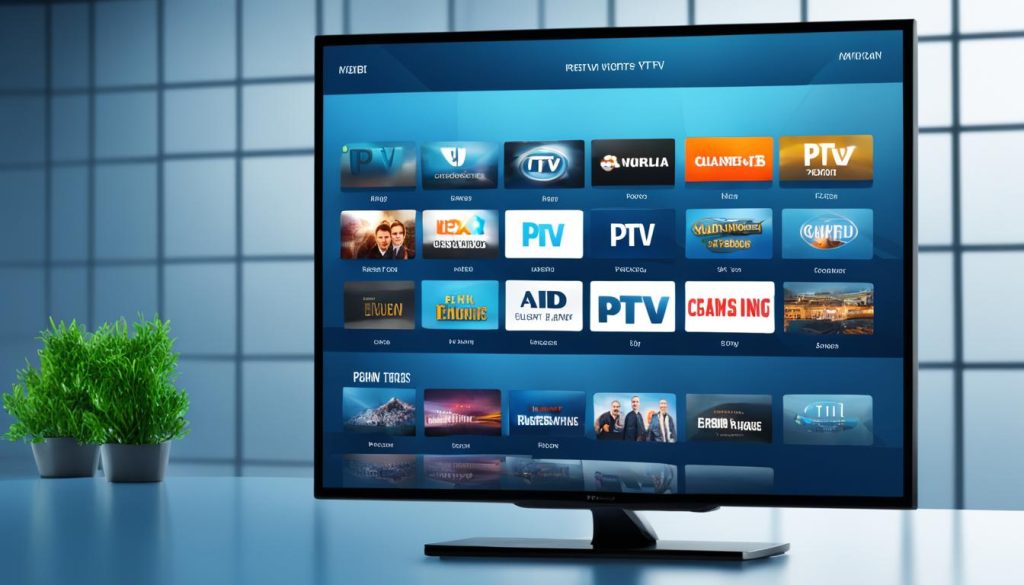IPTV, or Internet Protocol television, is a service that delivers television programming and video content over IP networks using the TCP/IP suite. It differs from traditional broadcast TV, cable TV, or satellite signals. IPTV is distributed by service providers and can deliver live TV programs or on-demand video content. It uses the internet protocol to transmit content, offering increased flexibility compared to traditional TV methods.
Key Takeaways:
- IPTV delivers television programming and video content over IP networks.
- It offers increased flexibility compared to traditional TV methods.
- IPTV can deliver live TV programs and on-demand video content.
- Service providers distribute IPTV and use the internet protocol for content transmission.
- IPTV provides personalized viewing experiences and advanced features like video on demand.
How Does IPTV Work?
IPTV, or Internet Protocol television, operates through a managed or dedicated network, such as DSL connectivity, to deliver its content. This technology uses the TCP/IP suite and transmits programming and video content over IP networks, distinguishing it from traditional broadcast TV, cable TV, or satellite signals.
When it comes to the transmission of IPTV content, a unicast format is used, which means that only one program is sent at a time. Whenever a viewer changes the channel, a new stream is transmitted directly from the provider’s server to the viewer’s device, allowing for seamless channel switching and instant access to different programs.
To access IPTV, viewers require specific customer premises devices, such as a set-top box, a Wi-Fi router, or a broadband internet connection. These devices act as gateways, enabling viewers to convert and receive the IPTV signals on their televisions or other compatible devices.
IPTV relies on IP multicasting and protocols like the Real-Time Streaming Protocol (RTSP) to deliver on-demand programs and offer interactive TV features. IP multicasting allows for the efficient distribution of content to multiple viewers simultaneously, reducing network congestion and optimizing bandwidth usage. RTSP facilitates the real-time streaming of media, enabling viewers to access on-demand content whenever they want.
“IPTV is revolutionizing the way we consume television content. With its flexible and efficient delivery mechanism, viewers have greater control over their viewing experience and can enjoy a wide variety of programs and entertainment options.”
Benefits of IPTV
IPTV offers several benefits to viewers. It provides increased flexibility with features like video on demand, interactive TV, and time shifting. Viewers can consume content in ways other than live broadcasts, such as digital recording or restarting a live program. IPTV also allows for personalized viewing experiences, as viewers can choose what they want to watch and when. The quality of service, uptime, bandwidth, and reliability can also be ensured by network operators.
“The flexibility of IPTV is a game-changer. I can watch my favorite shows whenever I want, pause and rewind live TV, and even record multiple programs simultaneously. It’s like having my own personalized TV station!”
– Emma Thompson, IPTV User
With IPTV, viewers can enjoy the convenience of on-demand access to a wide range of content. Whether it’s catching up on missed episodes, watching movies at their own pace, or exploring a library of documentaries, IPTV brings a world of entertainment at their fingertips. The ability to pause, rewind, and fast forward through live TV programs gives viewers the power to control their viewing experience.
Another major advantage of IPTV is its personalization feature. Viewers can choose from a variety of channels and programs, tailor their own content lineup, and create custom playlists. This allows them to focus on their specific interests and preferences, ensuring a more engaging and enjoyable viewing experience.
Network operators play a crucial role in ensuring the quality of service for IPTV users. They prioritize uptime, monitor bandwidth usage, and maintain a reliable infrastructure to deliver a seamless viewing experience. This commitment to quality ensures that viewers can enjoy their favorite shows without interruptions or buffering issues.
The benefits of IPTV extend beyond entertainment. It can also be used for educational purposes, providing access to documentaries, educational videos, and live lectures. In corporate settings, IPTV can be integrated into training programs and internal communications, enhancing collaboration and knowledge-sharing.
IPTV Reviews
Here are some reviews from satisfied IPTV users:
- “IPTV has completely transformed my TV-watching experience. I love being able to watch what I want, when I want, without being tied to a fixed schedule.” – David Smith
- “The picture quality of IPTV is amazing. It feels like I’m watching my favorite shows in high definition, with crisp visuals and vibrant colors.” – Sarah Johnson
- “IPTV has a vast library of content. There’s always something new to discover, whether it’s the latest movies, TV series, or live sports events.” – James Cooper
Overall, IPTV provides viewers with flexibility, convenience, and a customized viewing experience. With its wide range of content options and reliable service, it’s no wonder that IPTV is becoming increasingly popular among TV enthusiasts.
IPTV Services and Providers
IPTV services and providers cater to a wide range of audiences, offering a variety of channels and content options. From industry giants to niche companies, the IPTV landscape offers something for everyone.
When it comes to major IPTV providers, the names that come to mind are Roku, Hulu, YouTube, and Sony. These household names offer a vast selection of channels and on-demand content. With their extensive libraries and user-friendly interfaces, they have become go-to choices for many viewers seeking an all-in-one IPTV service.
However, beyond the big players, there is a whole world of smaller or niche companies that offer specialized IPTV services. One such provider is Apollo Group TV, which focuses on delivering high-quality entertainment options. Popcornflix is another notable name, offering a range of movies and TV shows. Perfect Player is yet another player in the IPTV field, known for its user-friendly interface and comprehensive channel list.
It’s worth mentioning that IPTV services are not limited to these providers alone. Large network operators like Verizon, Netflix, Google, and Apple also offer their IPTV services, expanding the options available to viewers. With such a diverse range of providers, everyone can find an IPTV service that suits their individual preferences and interests.
To give you an overview of the IPTV services and providers, here is a table showcasing some of the key players:
| Provider | Services | Channels | Subscription |
|---|---|---|---|
| Roku | Live TV, on-demand content | 1000+ | Subscription-based |
| Hulu | Streaming, live TV | 60+ | Subscription-based |
| YouTube | Live streaming, on-demand videos | Unlimited | Free and subscription-based |
| Sony | Live TV, on-demand content | 200+ | Subscription-based |
| Apollo Group TV | Specialized entertainment | 100+ | Subscription-based |
| Popcornflix | Movies, TV shows | 1000+ | Free with ads |
| Perfect Player | Comprehensive channel list | 5000+ | Subscription-based |
In this vast landscape of IPTV services and providers, viewers have the freedom to choose what suits their preferences, whether it’s a well-known industry giant or a specialized niche provider. With a range of channels, on-demand content, and subscription options, IPTV brings a personalized and immersive viewing experience to your fingertips.
IPTV Use Cases
IPTV offers a wide range of use cases, making it a versatile and powerful technology for both personal and corporate applications. By leveraging IPTV, users can enjoy a variety of services and applications, revolutionizing the way they consume television content.
1. Bundled Services
IPTV can be bundled with other IP-based telecommunication services, such as VoIP and high-speed internet. This integration provides users with a comprehensive package that meets all their entertainment and communication needs.
2. Video On Demand
With IPTV, users can access an extensive library of on-demand movies, TV shows, and other video content. They have the flexibility to choose what they want to watch and when, enjoying a personalized viewing experience.
3. Interactive TV
IPTV enables interactive features that enhance the television watching experience. Users can engage with their favorite shows through interactive menus, quizzes, voting, and more, creating an immersive and engaging viewing experience.
“IPTV’s interactive features have transformed how viewers engage with their favorite shows, transforming the passive activity of watching into an interactive and immersive experience.”
4. Time Shifting
One of the significant advantages of IPTV is the ability to time shift content. Users can pause, rewind, or fast-forward live TV programs, providing them with greater control over their viewing experience. This feature ensures that they never miss a moment of their favorite shows.
5. Corporate and Private Networks
IPTV is not limited to personal use; it is also widely used for media delivery in corporate and private networks. Companies can use IPTV to distribute training videos, corporate communications, and other internal content efficiently.
6. Live Television Broadcasts
IPTV is commonly used for live television broadcasts, allowing users to watch their favorite shows or events in real time. This includes live sports events, news broadcasts, and other real-time programming.
7. Catch-Up TV
With IPTV, users have the convenience of catching up on missed episodes or shows. Catch-up TV services enable users to access previously aired content, ensuring they never miss their favorite programs.
8. Media Delivery
IPTV providers offer a vast selection of channels and content, ensuring users have access to a variety of entertainment options. They can choose from a range of genres, including sports, movies, news, and more, catering to diverse preferences.
9. Multiscreen Viewing
IPTV enables multiscreen viewing, allowing users to access their favorite content on multiple devices, such as smartphones, tablets, and laptops. This flexibility ensures that users can enjoy their favorite shows anytime, anywhere.
Overall, IPTV offers a comprehensive range of use cases, revolutionizing the way users consume television content. Whether it’s time-shifting live TV, accessing on-demand movies, or engaging with interactive features, IPTV provides an unmatched viewing experience.
| Use Case | Description |
|---|---|
| Bundled Services | IPTV can be bundled with other IP-based telecommunication services like VoIP and high-speed internet. |
| Video On Demand | Users can access an extensive library of on-demand movies, TV shows, and other video content. |
| Interactive TV | IPTV enables interactive features like menus, quizzes, and voting to enhance the television watching experience. |
| Time Shifting | Users can pause, rewind, or fast-forward live TV programs, giving them greater control over their viewing experience. |
| Corporate and Private Networks | IPTV is used for media delivery in corporate and private networks, allowing efficient distribution of internal content. |
| Live Television Broadcasts | IPTV is commonly used for live television broadcasts, including sports events, news broadcasts, and real-time programming. |
| Catch-Up TV | Users can access previously aired content, ensuring they never miss their favorite programs. |
| Media Delivery | IPTV providers offer a vast selection of channels and content catering to diverse preferences. |
| Multiscreen Viewing | IPTV enables users to access their favorite content on multiple devices like smartphones, tablets, and laptops. |

IPTV vs. Internet TV
IPTV and internet TV are two distinct delivery models for televising content. While IPTV utilizes the internet protocol to transmit television programming, internet TV refers to TV content dispersed through a website via a broadband connection. The dissimilarities between these two methods are significant and worth exploring.
IPTV, meaning Internet Protocol television, provides viewers with a greater level of control and a wider range of options. It operates by delivering content over a private network, ensuring heightened security, improved performance, and an enhanced quality of service. By utilizing the internet protocol, IPTV enables viewers to access live TV programming, catch-up TV, and on-demand video content. With IPTV, viewers can enjoy exceptional flexibility and tailor their viewing experiences to suit their preferences and schedules.
Conversely, internet TV refers to television content that is streamed through a website using a broadband connection. This model is typically associated with popular online streaming platforms such as Netflix, Hulu, and Amazon Prime Video. Internet TV services focus primarily on distributing pre-recorded shows and movies, providing viewers with a vast library of content to choose from. However, internet TV may lack the interactive features and real-time broadcasting capabilities that IPTV offers.
IPTV offers a number of distinct advantages over internet TV:
- Increased Control: IPTV allows viewers to customize their viewing experiences, offering features such as personalized playlists, digital recording, and pausing or rewinding live TV programs.
- Broader Content Selection: IPTV providers typically offer a wide range of channels and on-demand content, ensuring viewers have access to an extensive selection of programming.
- Enhanced Quality: IPTV services prioritize network performance, ensuring a reliable and high-quality viewing experience.
- Secure and Private Network: IPTV operates over a private network, protecting user data and enhancing security.
In summary, while internet TV relies on website-based streaming through a broadband connection, IPTV delivers television programming via the internet protocol over a private network. IPTV offers viewers greater control, a broader content selection, and enhanced quality of service. With its numerous features and benefits, IPTV continues to shape the future of television broadcasting.
| IPTV | Internet TV | |
|---|---|---|
| Delivery Method | Utilizes the internet protocol to transmit television programming over a private network. | Streams TV content through a website using a broadband connection. |
| Control | Provides more control with features like personalized playlists, digital recording, and pausing or rewinding live TV. | Offers limited control over pre-recorded shows and movies. |
| Content Selection | Offers a wide range of channels and on-demand content. | Focuses on distributing pre-recorded shows and movies. |
| Quality of Service | Prioritizes network performance for a reliable and high-quality viewing experience. | Quality can vary depending on internet connection and streaming platform. |
| Network Security | Operates over a private network, ensuring data privacy and enhanced security. | Relies on internet connections and streaming platform security measures. |
IPTV and Device Compatibility
Accessing IPTV content depends on the service provider and the devices available. While newer Smart TVs often have built-in IP support for IPTV, older TVs may require a set-top box to translate the content for the screen. Popular set-top box options include Apple TV, Roku, and Amazon Fire TV. Computers can also stream IPTV without the need for a set-top box, providing a convenient option for users. Furthermore, many TV providers now offer hybrid IPTV services, combining traditional TV channels with IP-based services to provide users with increased flexibility and a diverse range of content.
The Future of IPTV
The IPTV market is set to witness significant growth in the coming years, with experts predicting a doubling of its market value by 2029. This growth is driven by the emergence of new providers and services alongside traditional TV providers, expanding the offerings of IPTV to a wider audience.
One area with immense potential for growth is catch-up TV, allowing viewers to access missed content at their convenience. The convenience of catch-up TV appeals to modern viewers who value flexibility and on-demand access to their favorite shows and movies.
Live IPTV is also gaining traction, especially with sports broadcasts. IPTV enables sports fans to watch their favorite teams and events in real-time, offering an immersive viewing experience with enhanced picture quality and streaming reliability. The convenience of live IPTV allows fans from all over the world to stay connected with the latest sporting events.
Additionally, there is the potential for live TV broadcasts to be added to popular video-on-demand (VOD) platforms like Netflix. This integration would offer viewers a seamless transition between live TV and on-demand content, providing them with a comprehensive entertainment experience within a single platform.
“The future of IPTV is bright, with endless possibilities for innovation and expansion. As technology evolves, we can expect improvements in streaming quality, user interfaces, and content personalization. IPTV will continue to shape the way we consume television and revolutionize the entertainment industry.”
As IPTV services evolve, advancements in technology will play a crucial role. The integration of artificial intelligence and machine learning algorithms can enhance content recommendation systems, providing users with personalized suggestions based on their viewing habits and preferences. This innovation will further enhance the user experience and keep viewers engaged.
Furthermore, the growth of IPTV services will compel network operators to invest in advanced infrastructure, ensuring high-speed connections and uninterrupted streaming. These developments will help cater to the ever-increasing demand for IPTV services and provide users with a seamless viewing experience.
The future of IPTV is indeed promising. As the market expands and technology continues to advance, we can expect a wider range of services, increased availability of content, and improved user experiences. IPTV will undoubtedly continue to transform the way we consume television and shape the future of entertainment.
| Advantages of the Future of IPTV | Challenges of the Future of IPTV |
|---|---|
| 1. Enhanced streaming quality and reliability | 1. Internet infrastructure upgrades |
| 2. Personalized content recommendations | 2. Content licensing and copyright issues |
| 3. Seamless integration of live TV and VOD | 3. Increased competition among service providers |
| 4. Access to a wide range of international channels | 4. Evolving consumer preferences |
| 5. Flexibility to watch content anytime, anywhere | 5. Privacy and data security concerns |
Conclusion
In conclusion, IPTV (Internet Protocol television) is a modern service that revolutionizes the way we consume television and video content. By utilizing IP networks and the TCP/IP suite, IPTV delivers a wide range of programming options, including live TV, catch-up TV, and video on demand. This technology offers viewers increased flexibility, allowing them to watch their favorite shows and movies whenever and wherever they want.
One of the key benefits of IPTV is its ability to provide personalized viewing experiences. Viewers have the freedom to choose what they want to watch and when they want to watch it. Whether it’s a favorite TV show or a newly released movie, IPTV ensures that the content is available at their convenience.
The future of IPTV is promising, with the market expected to grow rapidly in the coming years. As more providers and services enter the industry, viewers can expect an even wider selection of channels and content. The advancements in technology and the increasing demand for high-quality video streaming will continue to drive the development of IPTV services, making it an exciting time for television enthusiasts.
FAQ
What is IPTV?
IPTV (Internet Protocol television) is a service that delivers television programming and video content using the TCP/IP suite over IP networks. It differs from traditional broadcast TV, cable TV, or satellite signals.
How does IPTV work?
IPTV content is delivered over a managed or dedicated network, such as DSL connectivity. The content is transmitted in a unicast format, meaning only one program is sent at a time. When a viewer changes the channel, a new stream is transmitted from the provider’s server directly to the viewer. IPTV requires a set-top box or other customer premises devices, such as a Wi-Fi router or a fiber optic or broadband internet connection.
What are the benefits of IPTV?
IPTV offers increased flexibility with features like video on demand, interactive TV, and time shifting. Viewers can consume content in ways other than live broadcasts, such as digital recording or restarting a live program. IPTV also allows for personalized viewing experiences, as viewers can choose what they want to watch and when.
Who are the IPTV services and providers?
IPTV services and providers range from large network operators like Verizon and major companies like Netflix, Google, and Apple, to niche companies specializing in specific types of content. Major IPTV providers include Roku, Hulu, YouTube, and Sony. There are also smaller or niche companies offering IPTV services, such as Apollo Group TV, Popcornflix, and Perfect Player.
What are the use cases for IPTV?
IPTV is used for live television broadcasts, catch-up TV, and video on demand. It is also used for media delivery in corporate and private networks. IPTV providers offer a range of channels and content.
What is the difference between IPTV and internet TV?
IPTV uses the internet protocol to deliver television programming, while internet TV refers to TV content distributed through a website via a broadband connection. IPTV provides more control and options for viewers, delivering content over a private network with increased security, performance, and quality of service.
Is IPTV compatible with all devices?
IPTV can be accessed on various devices depending on the service provider. Older TVs might require a set-top box like Apple TV, Roku, or Amazon Fire TV to translate the content for the TV. Computers can stream IPTV without a set-top box, and Smart TVs may have built-in IP support for IPTV. Many TV providers offer hybrid IPTV services, combining traditional TV with IP-based services for increased flexibility.
What is the future of IPTV?
The IPTV market is expected to grow significantly in the coming years, with experts predicting that the market value will double by 2029. New providers and services are emerging alongside traditional TV providers, expanding the offerings of IPTV. Catch-up TV, live IPTV, and video on demand are areas with potential for growth.
What is IPTV’s role in the media industry?
IPTV enables various services and applications like video on demand, interactive TV, in-program messaging, and time shifting. It is used for media delivery in corporate and private networks, and sports broadcasts have quickly embraced IPTV. There is potential for live TV broadcasts to be added to VOD platforms like Netflix.
Can you provide a summary of IPTV?
IPTV, or Internet Protocol television, is a service that delivers television programming and video content over IP networks using the TCP/IP suite. It offers increased flexibility compared to traditional broadcast TV by allowing viewers to watch live TV, catch-up TV, and video on demand. The future of IPTV looks
So, what exactly is IPTV and how does it work? In simple terms, IPTV utilizes internet protocol (IP) packets to transmit TV signals. These packets are received by a set-top box or a compatible device connected to a TV. The device then decodes the packets and displays the content on the screen. This technology offers numerous benefits, such as the ability to watch live TV, catch-up on missed episodes, and access video-on-demand services.
IPTV providers play a crucial role in delivering the IPTV service to consumers. These providers offer various subscription packages, allowing users to choose the channels and content they want to stream. They acquire the rights to distribute the content and maintain the necessary infrastructure to ensure a seamless viewing experience. Additionally, some IPTV providers also offer advanced features like interactive TV, time-shifted programming, and digital video recording.
With the increasing popularity of IPTV, it’s important to note that its meaning has evolved beyond just television broadcasting. IPTV now encompasses a broader concept of delivering multimedia services, including internet access and telephone services over IP networks. The flexibility and convenience of IPTV make it an appealing choice for consumers and a promising industry for providers. As the demand for online media consumption continues to rise, the future of IPTV looks bright with more innovations and options on the horizon.
promising, with the market expected to grow and new providers and services entering the industry.



